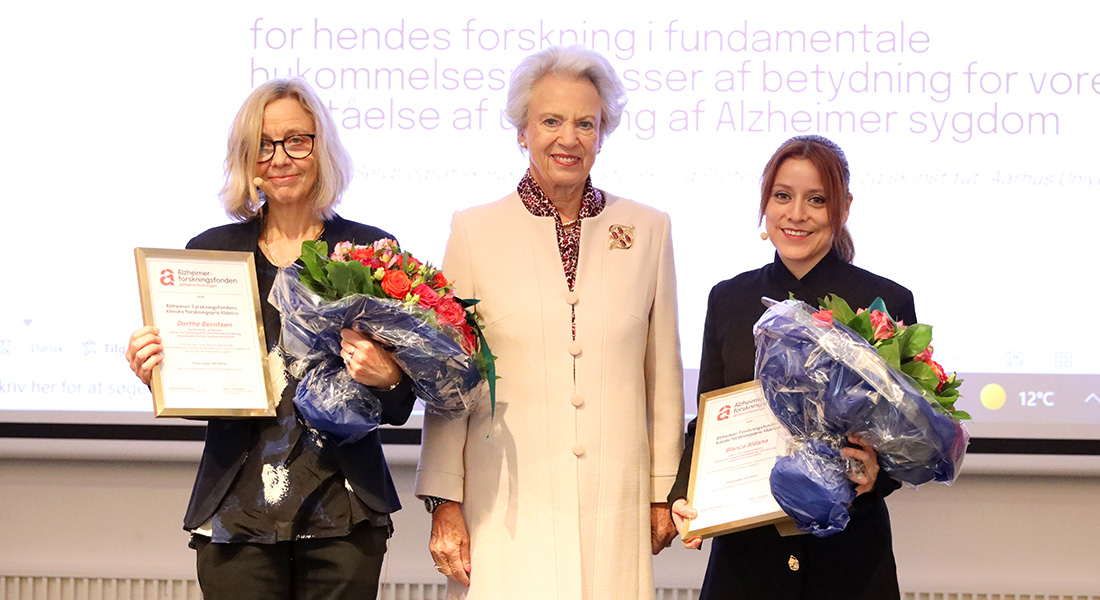Blanca Aldana receives Alzheimerforeningen’s Forskerprisen 2024
Alzheimerforeningen and Alzheimer-forskningsfonden have given Associate Professor Blanca Aldana Forskerprisen for her major contributions to the field of dementia.

HRH Princess Benedikte is patroness of Alzheimerforeningen and presented Blanca Aldana with the prize at a festive event that took place at Kosmopol 3 October. The prize consists of 300.000 DKK.
Blanca Aldana received the prize for basic research and Professor Dorthe Berntsen from Aarhus University received the prize for
clinical research.
On receiving Forskerprisen 2024, Blanca Aldana states:
“Receiving the Forskerprisen 2024 from the Alzheimer-forskningsfonden is an incredible honor. It is a profound recognition of the hard work and dedication of my entire research team. This award not only validates our efforts but also inspires us to continue pushing the boundaries of our understanding of Alzheimer’s disease. Coming from a distant country, it is particularly rewarding to be able to contribute to both Danish and global research.
This recognition underscores the importance of our research in the quest to find disease mechanisms to enable effective treatments and ultimately a cure for this devastating condition. I am deeply grateful for this acknowledgment and the support it brings to our ongoing projects.”
Pharma Communications has asked Blanca Aldana a few questions about her research into Alzheimer’s disease.
Describe what you find particularly interesting and challenging regarding Alzheimer’s disease.
“Alzheimer’s disease is particularly fascinating and challenging due to its complex and multifaceted nature. It is a disorder that not only affects memory and cognition but also deeply impacts individuals, families, and society.
The fact that we still do not fully understand the precise causes of Alzheimer's disease, nor have a cure, makes this area of research particularly significant. One of the most intriguing aspects is the interplay between neurodegeneration and metabolic dysfunction. Understanding how these processes interact at the cellular and molecular levels is crucial for developing targeted therapies.
Additionally, the variability in disease progression among patients and limited treatment options currently available present a significant challenge. This heterogeneity requires a personalized approach to research and treatment, making it a highly dynamic and evolving field.”
How are you working with these challenges as a researcher?
“To tackle the complex challenges posed by Alzheimer’s disease, I believe it is essential to work collaboratively with multidisciplinary teams. As a researcher, I am addressing these challenges through an integrative approach that combines metabolic interventions, advanced biochemical methods, transgenic animal models, and induced pluripotent stem cell (iPSC) technology.
Our research focuses on the metabolic interactions between brain cells, particularly how immune cells in the brain, such as microglia and astrocytes, influence neuronal health and function. By investigating these interactions, we aim to identify new metabolic targets for therapeutic intervention.
It is also crucial that investment in research on brain diseases continues to be a priority for funding organizations and the Alzheimer-forskningsfonden exemplifies such support. Collaboration with other experts in the field and continuous engagement with the latest knowledge advancements are key components of our strategy to tackle the complexities of Alzheimer’s disease.”
